Piles or haemorrhoids are a medical condition that causes the veins around your rectum and lower anus to swell. Symptoms of Piles include pain and discomfort during and after passing stools while sitting and standing up, painful lumps in and around the anus and bloody stools.
Piles can be both internal and external. Internal piles cannot always be diagnosed during the external examination, however, they sometimes may protrude out of the anus region as in the case of external haemorrhoids. Pile is a disease that is not exactly rare, however, the symptoms can sometimes be easily missed as they are not always detectable and obvious. With surgery, Piles can be removed. However, if your condition is not severe, your doctor may recommend some medicines, lifestyle and dietary changes that will help you cope with the condition. This article will shed light on the types of food you should eat to deal with Piles more effectively.
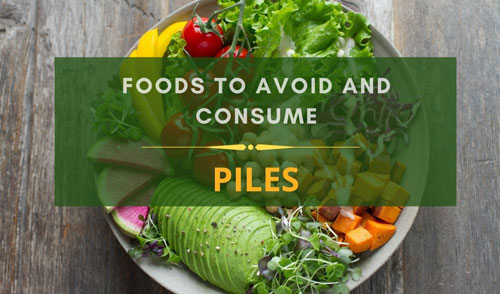
9 Best food diets to cope with Piles
Piles are a rather painful condition that causes discomfort when you are sitting or even standing. Fortunately, several food items can help reduce the risk factors of Piles (constipation, bloating and other digestive issues) from occurring in the first place:
Legumes: By making sure you are getting enough fibre in your diet daily, you can reduce the chances of piles flare-ups. There are essentially two kinds of fibre that can be derived from food – soluble and insoluble. The soluble fibre forms a gel in your digestive tract and can be digested by friendly bacteria. On the other hand, insoluble fibre helps bulk up your stool. Legumes include beans, lentils, peas, soybeans, peanuts and chickpeas that are loaded with both kinds of fibre but are especially rich in the soluble type. Lentils and other legumes can bulk up your stool, making it less likely that you have to strain when going to the bathroom.
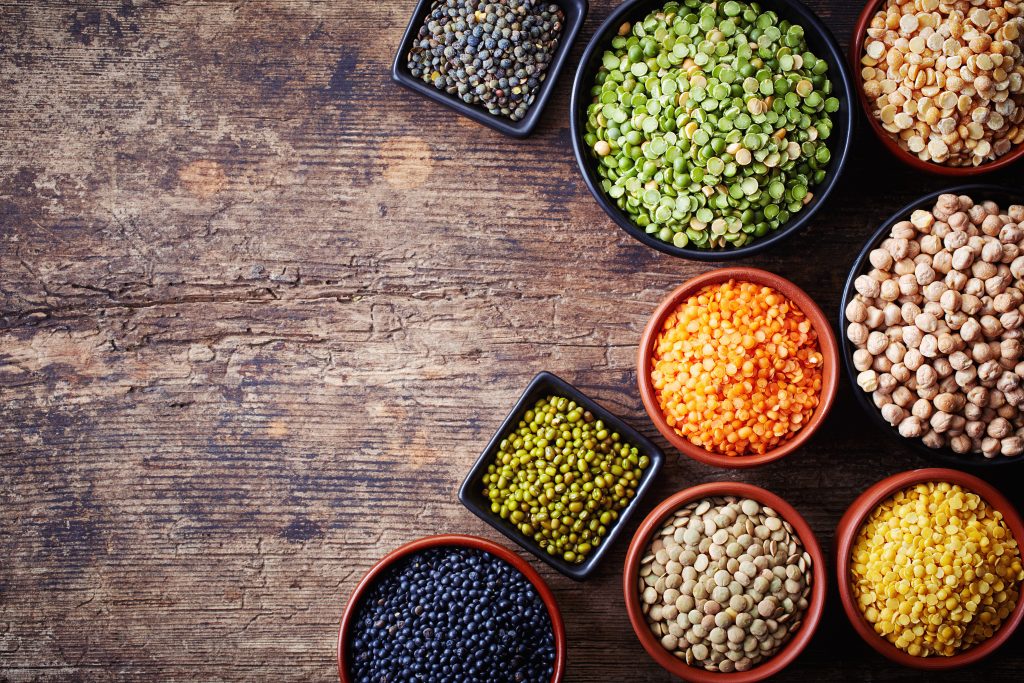
Cruciferous vegetables like Broccoli: Vegetables like cauliflower, Brussel sprouts, broccoli, bok choy, kale, arugula, tulips, cabbage and radishes are known for having an immense amount of insoluble fibre. Cruciferous vegetables like these contain a plant chemical called glucosinolate that can easily be broken down by gut bacteria, thus promoting easy stool passing and reducing symptoms of a new flare-up of piles.
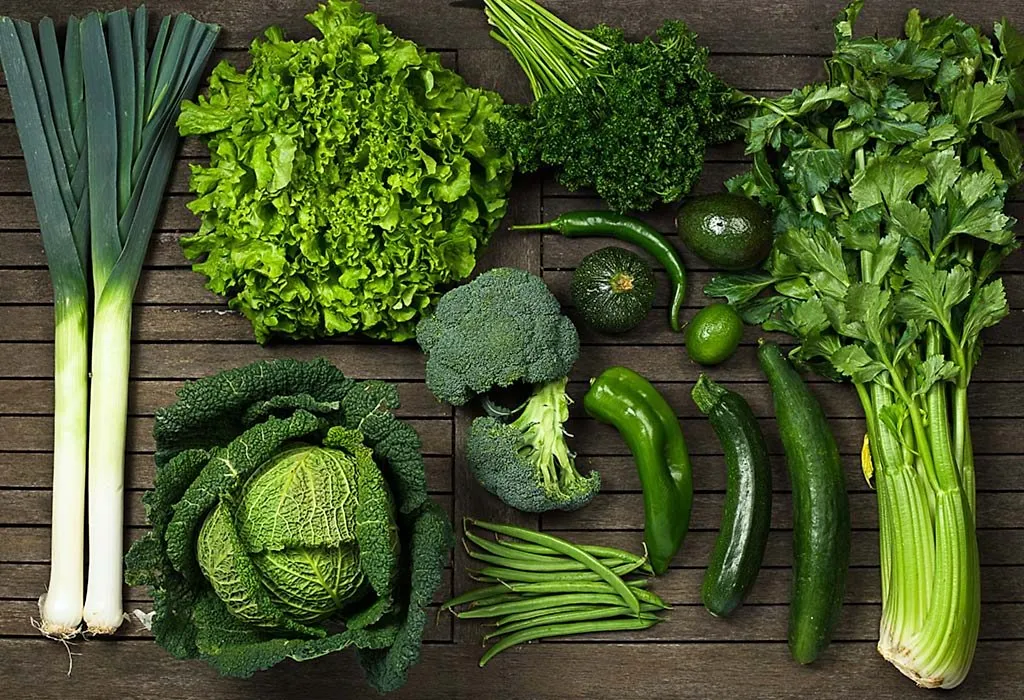
Root vegetables: Turnips, beets, rutabagas, carrots, sweet potatoes and potatoes are root vegetables. They keep you full for a long time and are extremely nutritious. Besides, they are full of gut-friendly fibre. For example, cooked and cooled white potatoes contain a kind of carbohydrate known as resistant starch, which passes through your digestive tract undigested. Similar to soluble fibre, they help feed your gut bacteria and pass stool easily.
Bell peppers: Packed with vitamins like vitamin C and minerals, bell peppers are also a great option while adding fibre to your diet. A cup of mild bell peppers contains about 2 grams of fibre. With a water content of about 93%, bell peppers are also very hydrating and help with clear stool passing.
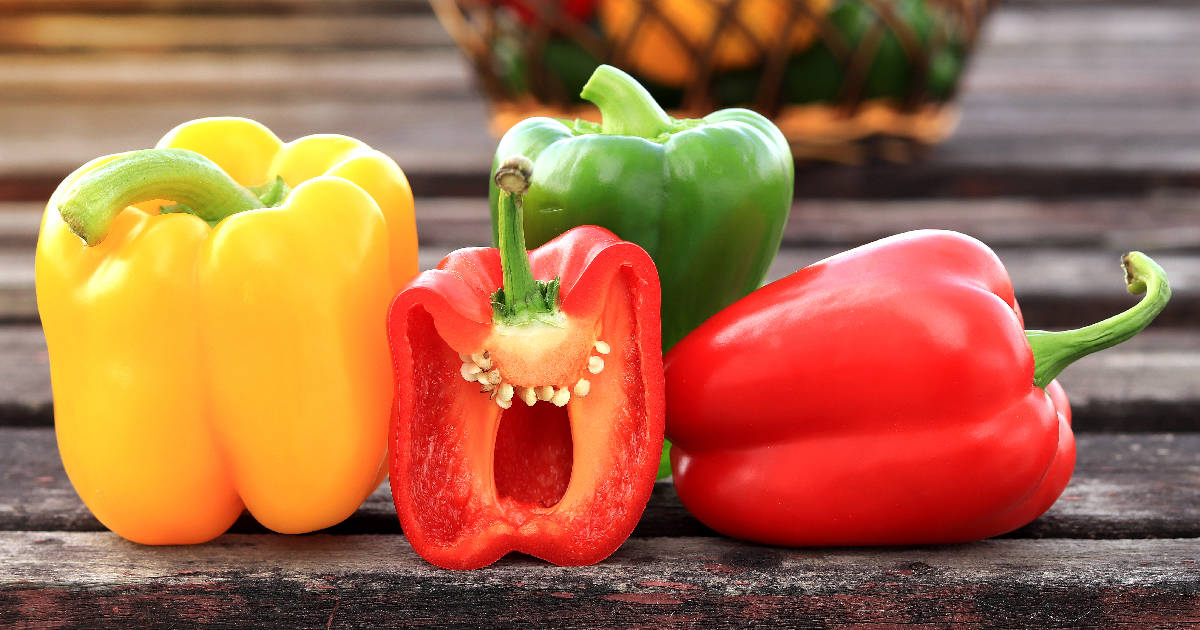
Whole grains: Similar to legumes, whole grains are a nutritional powerhouse as they retain their germ, bran and endosperm, all of which are loaded with fibre content. Whole grains are known to be rich in insoluble fibre. The benefit of insoluble fibre is that, since they cannot be digested, they add volume to your stool and help you excrete with ease, with less pain and discomfort that comes with piles. Spelt, quinoa, barley, brown rice, oats, whole rye and corn are some beneficial whole grains. For example, you can prepare and consume oatmeal to reduce symptoms of piles. Oatmeal contains a special soluble fibre called beta-glucan, which benefits your gut microbiome by acting like a prebiotic, which in turn feeds the healthy gut bacteria and helps you excrete with ease.

Squash: This vegetable brings life and colour to your plate, while also feeding you with an immense amount of fibre. There are various kinds of squash like pumpkin, acorn squash, yellow squash, butternut squash and zucchini. Acorn squash has the highest amount of fibre, about 9 grams in every cup of this vegetable (205 grams). Sautéed, roasted or boiled squashes may help ward off any symptoms of piles.
Bananas: They are an ideal addition to your diet to calm piles symptoms. Loaded with pectin and resistant starch, a single banana provides an average of 3 grams of fibre. The combination of pectin and resistant starch helps in clearing stool easily.
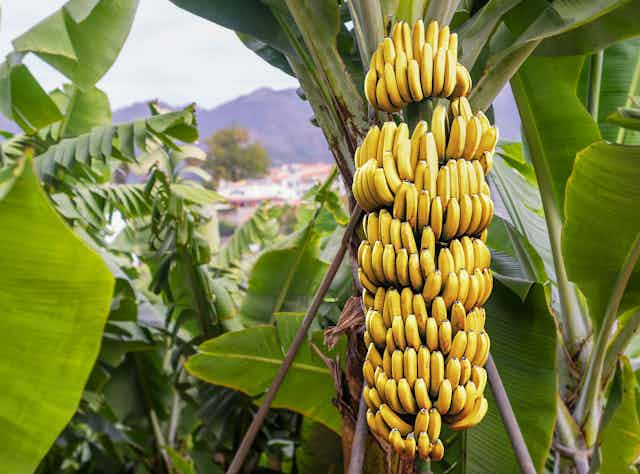
Tomatoes: Tomatoes contain loads of fibre optic and have good water content. It aids in easing symptoms of constipation by making you strain less while passing bowels. Tomatoes contain a natural antioxidant called naringenin that, according to some scientists, has a laxative effect on constipation.
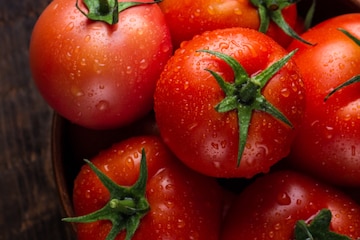
Citrus fruits: Fruits like oranges, lemons and grapes are rich in vitamin C. The inner skin of these fruits beneath the outer layer has a lot of fibre. Citric fruits have ample water content that softens stools. Like tomatoes, citrus fruits also contain naringenin, a natural compound that has a laxative effect.

Based on the Dietary Guidelines for Americans, it is recommended that you consume an adequate amount of dietary fiber for optimal health. For a 2,000-calorie diet, this means aiming for around 28 grams of fiber per day.
Foods to Avoid In Piles:
All food items that are low in fibre should be avoided. Some of them are as follows:
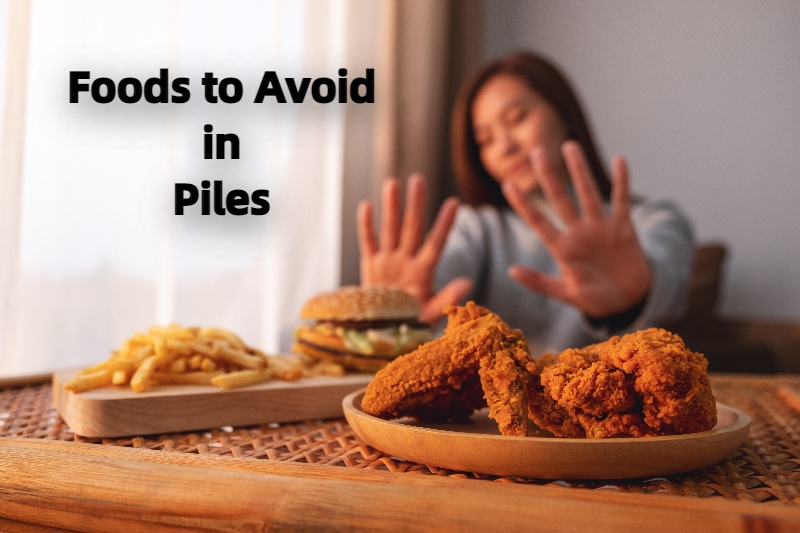
- Processed meats: These cold-cut meats are very low in fibre and have high sodium content. Consuming less processed meats during piles is best.
- White flour: With bran and germ removed, white flour does not have much fibre left. White bread, pasta and bagels are made from white flour and should be avoided.
- Dairy products: Milk, cheese and other heavy cream products should be avoided. Yoghurt, on the other hand, is loaded with probiotics that feed the gut bacteria and thus can be consumed.
- Red meat: Among all kinds of meat, this is one of the hardest to digest and can delay stool passing, thus is not beneficial for people with symptoms or tendencies swaying towards piles.
- Fried foods: They are difficult to digest and may cause trouble while excreting.
- Snacks and salty foods: These food items should be avoided by all, but especially people with piles. They cause bloating, making excretion a tedious task.
- Spicy food: Not only low in fibre but spicy foods can also be associated with pain and discomfort for people with piles while passing stool.
- Alcohol: Alcohol makes you dehydrated. Consuming alcohol for a patient may prove to aggravate stool passing. It dries up your stool and is not a good option for people with piles.
- Caffeinated beverages: Strong tea and coffee are known to harden stools. This effect does not essentially work in the favour of people with haemorrhoids, making it difficult to excrete.
- Packaged foods: All kinds of pre-packed foods pumped with nitrogen to inflate, like chips, are not healthy in general, but due to lack of fibre they should be strictly avoided by people who are showing symptoms or have piles.
Piles friendly recipes to try:
- Whole Wheat Muffins with bananas and walnuts
- Preheat the oven to 350 °F.
- In a clear bowl, mash ripe bananas with a fork until a paste is made.
- Make a mixture of sugar, flour, baking powder and walnuts and salt. Add egg and almond milk to the banana mixture, then combine dry and wet ingredients.
- Pour batter into a non-stick muffin pan.
- Bake for 30-40 minutes and then transfer muffins to a cooling rack.
- Serve warm.
2. Barley soup with carrots
- Boil water in a pot.
- As it simmers, add barley and let it simmer covered for about 25-30 minutes over low heat.
- Once the water has evaporated, remove it from heat and set it aside.
- In another pot, cook onion in olive oil over medium heat until soft.
- Add stock and carrots and bring to a boil. Reduce to a simmer, cover and cook for 20 minutes.
- Add cooked barley and let simmer for another minute or two. Remove from heat.
- Serve hot immediately.
3. Wholesome fruit salad
- In a small bowl, whisk together honey, orange juice and lemon zest together.
- Chop fruits of choice – seasonal fruits like mangoes and grapes, strawberries, dry fruits like dates and raisins, bananas, kiwis, apples and oranges
- Transfer the fruits to a large mixing bowl.
- Add the dressing prepared and drizzle it all over the fruits
- Give it a gentle toss and chill before serving a bowl.
4. Gluten-free high fibre salad
- Take out canned beans and corn from the container and wash thoroughly to decrease salt content.
- Chop vegetables of choice – bell peppers, lettuce, olives, onions and carrots.
- Transfer all of this to a large mixing bowl.
- Add olive oil, vinegar, finely minced garlic and a dash of lime.
- The beans and corn already have salt, however, if you wish to add a pinch of salt, you can do so.
- Serve fresh and crisp without allowing the veggies to wilt.
Thus, with proper care, good food, discomfort, pain and inflammation caused by piles can be curbed and reduced while avoiding controversial food items. Depending on the severity of your condition, along with medication and a good diet, you should be able to overcome your condition in a few weeks to a few months.


